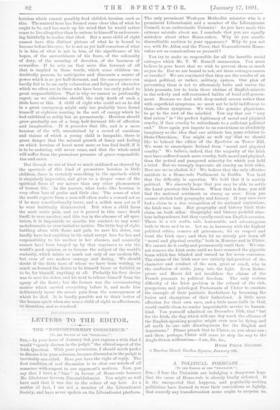LETTERS TO THE EDITOR.
THE "NONCONFORMIST CONSCIENCE."
[TO THE EDITOR OF THE " EPECTATOE."1
Snts—In your issue of January 3rd, you express a wish that I would " openly discuss in the pulpit " the ethical aspect of the Irish Question. With your permission, I should much prefer to discuss it in your columns, because discussion in the pulpit is inevitably one-sided. Here you have the right of reply. The first condition of real discussion is to clear our minds of all nonsense with respect to our opponent's motives. Now, you say that I have a " bias " in favour of Home-rule because Mr. Gladstone favours Disestablishment. You might as well have said that it was due to the colour of my hair. As a matter of fact, I am not a member of the Liberationist Society, and have never spoken on the Liberationist platform.
The only prominent Wesleyan Methodist minister who is a. proininent Liberationist and a member of the Liberationist Council, is an enthusiastic Unionist! As you have made this. extreme mistake about me, I conclude that you are equally mistaken about other Home-rulers. Why do you ascribe• discreditable motives to your opponents P Why do you not see, with Dr. Allen and the Times, that Nonconformist Home- rulers are as conscientious as yourself P
You try to make us responsible for all the horrible social outrages which Mr. T. W. Russell enumerates. You must believe in your heart that we wish to prevent them as much. as you do. But we are bound to ask, are these outrages causes. or results P We are convinced that they are the results of an unjust political, or rather, military, system. Our plan of preventing them is not to alternately bribe and coerce the Irish peasants, but to train those victims of English misrule in the orderly and self-restrained habits of local self-govern- ment. Because we deal with deep-rooted causes rather than with superficial symptoms, we must not be held indifferent to- those odious symptoms. We wish, like genuine physicians,. to go to the root of the mischief. You say that our "very first axiom" is "the perfect legitimacy of moral and physical, cruelty, if that cruelty be subordinate to a sufficient political end." Here again you impute to us convictions as absolutely imaginary as the idea that our attitude has some relation to State-Churchism, You might as well say that we should like to behead the editor of the Spectator on Tower Hill.. We want to emancipate Ireland from " moral and physical cruelty." We believe, indeed, that the majority. of the Irish race have suffered much more cruelty, both moral and physical,. than the petted and pampered minority for which you hold a brief. But we strongly deprecate all cruelty on both sides. How are we to abolish it ? We believe that the only effective antidote is a Home-rule Parliament in Dublin. You hold that the difficulty is agrarian. We hold that it is mainly political. We sincerely hope that you may be able to settle• the Land question this Session. When that is done, you will find the national sentiment as strong as ever. Even you cannot abolish both geography and history. If any race ever had a claim to a due recognition of its national aspirations, the Irish race has. But geography and history limit their claim on both sides. Geography and history prohibit abso- lute independence, but they equally condemn English coercion.. There is a via media, safe, honourable, and advantageous both to them and to us. Let us, in harmony with the highest political ethics, remove all grievances; let us respect and trust the Irish race; and then let us sternly put down all " moral and physical cruelty," both in Munster and in Ulster.. We cannot do it really and permanently until then. We can- not remove the Irish mote until we have removed the gigantic beam which has blinded and cursed us for seven centuries. The claims of the Irish race are entirely independent of the character and conduct of the men, great or small, who in the confusion of strife, jump into the light. Even Robes- pierre and Murat did not invalidate the claims of the French peasants to political freedom. The only serious difficulty of the Irish problem is the refusal of the rich,- prosperous, and privileged Protestants of -Ulster to emulate• the example of their patriotic forefathers by becoming the lovers and champions of their fatherland. A little more affection for their on race, and a little more faith in God,. would enable them to render imperishable service to human- kind. You yourself admitted on December 13th, that "but for the Irish, the flag which will one day mark the alliance of the English-speaking peoples might even now be flying, and all earth be one safe drawing-room for the English and Americans." Please preach that to Ulster, as you alone can and then, perhaps, Ulster will cease to stop the way to the• Anglo-Saxon millennium.—I am, Sir, &c., HUGH PRICE HuanEs.
Taviton Street, Gordon Square, January 81A.






































 Previous page
Previous page